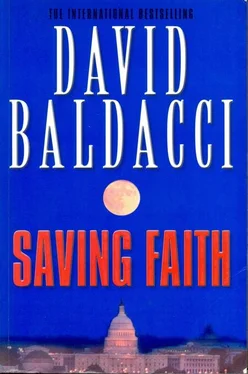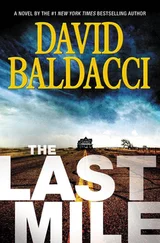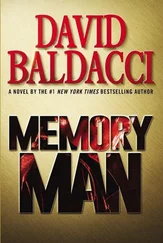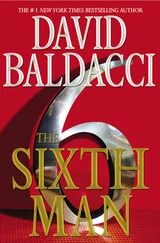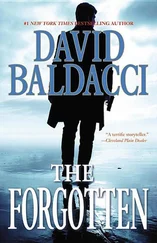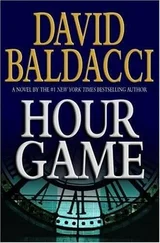David Baldacci - Saving Faith
Здесь есть возможность читать онлайн «David Baldacci - Saving Faith» весь текст электронной книги совершенно бесплатно (целиком полную версию без сокращений). В некоторых случаях можно слушать аудио, скачать через торрент в формате fb2 и присутствует краткое содержание. Жанр: Политический детектив, на английском языке. Описание произведения, (предисловие) а так же отзывы посетителей доступны на портале библиотеки ЛибКат.
- Название:Saving Faith
- Автор:
- Жанр:
- Год:неизвестен
- ISBN:нет данных
- Рейтинг книги:4 / 5. Голосов: 1
-
Избранное:Добавить в избранное
- Отзывы:
-
Ваша оценка:
- 80
- 1
- 2
- 3
- 4
- 5
Saving Faith: краткое содержание, описание и аннотация
Предлагаем к чтению аннотацию, описание, краткое содержание или предисловие (зависит от того, что написал сам автор книги «Saving Faith»). Если вы не нашли необходимую информацию о книге — напишите в комментариях, мы постараемся отыскать её.
Saving Faith — читать онлайн бесплатно полную книгу (весь текст) целиком
Ниже представлен текст книги, разбитый по страницам. Система сохранения места последней прочитанной страницы, позволяет с удобством читать онлайн бесплатно книгу «Saving Faith», без необходимости каждый раз заново искать на чём Вы остановились. Поставьте закладку, и сможете в любой момент перейти на страницу, на которой закончили чтение.
Интервал:
Закладка:
There were five hundred and thirty-five members of Congress—a hundred senators plus the representatives in the House. Well over three-quarters of them, Buchanan estimated perhaps a little generously, were decent, hardworking, genuinely caring men and women who believed strongly in what they were doing both in Washington and for the people. Buchanan termed them, collectively, the "Believers." Buchanan stayed away from the Believers. Touching those folk would only have earned him a quick trip to prison.
The rest of the Washington leadership were like Harvey Milstead. Most were not drunks or womanizers or shells of their former selves, but, for various reasons, they were ripe for manipulation, easy targets for the lures Buchanan was tossing overboard.
There were two such groups that Buchanan had successfully recruited over the years. Forget Republicans and Democrats. The parties Buchanan was interested in were the members of the venerable "Townies," and the group Buchanan had labeled, only somewhat tongue-in-cheek, the "Zombies."
The Townies knew the system better than anyone. They were the system. Washington was their town, hence the nickname. They had all been here longer than God. If you cut them, their blood would run red, white and blue, or so they liked to tell you. There was another color Buchanan had added to that mix: green.
By contrast, the Zombies had come to Congress with nary a stitch of moral fiber or whiff of a political philosophy. They had won their place of leadership with the finest campaigns that media dollars could buy. They were fabulous on sound bite TV and in the confines of tightly controlled debates. They were, at best, mediocre in intellect and ability and yet delivered the sales pitch with the verve and enthusiasm of a JFK at his oratorical best. And when they were elected, they arrived in Washington with absolutely no idea what to do. Their only goal had already been achieved: They had won their campaign.
However, despite this, the Zombies tended to stay in Congress because they loved the power and access that came with being an incumbent. And with the cost of elections going through the stratosphere, it was still possible to defeat an entrenched incumbent ... in the same way that it was still theoretically possible to climb Mount Everest without oxygen. One only had to hold his breath for several days.
Buchanan and Milstead sat down on a comfortable leather couch in the senator's spacious office. The shelves were filled with the usual spoils of a longtime politician: plaques and medals of appreciation, silver cups, awards made of crystal, hundreds of photographs of the senator standing with people even more famous than he; inscribed ceremonial gavels and bronzed miniature shovels symbolizing political pork brought to his state. As Buchanan looked around, it occurred to him that he had spent his entire professional life coming to places such as this, hat in hand, essentially begging.
It was early yet, but the man's staff was busy in the outer suite preparing for a hectic day with Keystone State constituents, a day laced with lunches, speeches, appearances and pop-in-and-out dinners, meet-and-greets, drinks and parties. The senator was not up for reelection, but it was always nice to put on a good show for the people back home.
"I appreciate your meeting with me on such short notice, Harvey."
"Hard to refuse you, Danny."
"I'll get right to it. Pickens's bill is looking to knock out my funding, along with about twenty other aid packages. We can't let that happen. The results speak for themselves. The infant mortality rate has been cut seventy percent. My God, the wonders of vaccine and antibiotics. Jobs are being created, the economy is moving from thuggery to legitimate business. Exports are up by a third, and imports from us are up twenty percent. So you see it's creating jobs here too. We can't let the plug be pulled now. Not only is it morally wrong, it's stupid from our side. If we can get countries like this on their feet, we won't have a trade imbalance. But you need reliable sources of electricity first. You need an educated population."
"AID is accomplishing a lot," the senator pointed out.
Buchanan was intimately familiar with AID, or the Agency for International Development. Formerly an independent agency, it now reported to the Secretary of State, who also more or less controlled its very substantial budget. AID was the flagship of American foreign aid, with the vast majority of funds flowing through its long-standing programs. Every year it was like musical chairs to see where AID's limited budget dollars would end up. Buchanan had been caught without a seat many times, and he was so weary of it. The grant process was intensive and highly competitive, and unless you fit the template set up by AID for the programs it wanted to sponsor, you were out of luck.
"AID can't do it all. And my clients are too small a bite for IMF and the World Bank. Besides, now all I hear is 'sustainable development.' No dollars unless it goes for sustainable development. Hell, last time I looked, food and medicine were necessary for life. Doesn't that qualify?"
"You're preaching to the choir, Danny. But people count pennies around here too. The days of fat are over," Milstead said solemnly.
"My clients will take gristle. Just don't cut them off."
"Look, I just won't schedule the bill."
In the Senate, if a chairman didn't want a bill to get out of committee, he simply didn't schedule it for hearing, as Milstead was now suggesting. Buchanan had played that game many times before.
"But Pickens could end-run you on that," Buchanan said. "Word is he's dead set on getting this thing heard one way or another. And he might get a more sympathetic audience on the floor than he would in committee. Why not put a hold on the bill and run it out of session?" Buchanan suggested.
Danny Buchanan was the master at this technique. A hold was simply one senator objecting to a pending bill. The legislation would be in complete limbo until the hold was removed. Years ago, Buchanan and his allies on the Hill had used it to stunning effect in representing the most powerful special interests in the country. It took real power in Washington to make things not happen. And for Buchanan, that had always been the most fascinating aspect of the city. Why health care reform legislation or the tobacco settlement bills, propelled by intense media coverage and public clamor, simply disappeared into the yawning gulf of the Congress. And it was very often the case that special interests wanted to maintain the status quo they had worked so hard to erect. For them change was not good. Hence, a good deal of Buchanan's previous lobbying work had focused on burying any legislation that would harm his powerful clients.
The hold maneuver was also known as the "blind rolling" hold because, as in the passing of the baton on a relay team, a different senator could place a new hold when the previous one had been released, and only the leadership knew who had placed the restriction. There was a lot more to it, but at the end of the day the blind rolling hold was an enormous waste of time, and hugely effective, which explained much of politics in a nutshell, Buchanan well knew.
The senator shook his head. "I found out Pickens has holds on two of my pieces, and I'm close to cutting a deal that'll make him let go. I hit him with another hold and the sonofabitch'll clamp down on my ass like a ferret on a cobra."
Buchanan sat back and sipped his coffee as a number of potential strategies rolled through his mind. "Look, let's go back to square one. If you have the votes to knock it out, schedule it and let the committee vote on it and kill the bastard for good. Then if he takes it to the floor I can't believe he'll have the support to carry it. Shit, once it's on the floor we can hold it up forever, ask for amendments, hit it in the cloak room, cut the crap out of it pretending to want to deal for some juice on one of your bills. In fact, we're so close to the elections now we can even play the quorum call game until he yells uncle."
Читать дальшеИнтервал:
Закладка:
Похожие книги на «Saving Faith»
Представляем Вашему вниманию похожие книги на «Saving Faith» списком для выбора. Мы отобрали схожую по названию и смыслу литературу в надежде предоставить читателям больше вариантов отыскать новые, интересные, ещё непрочитанные произведения.
Обсуждение, отзывы о книге «Saving Faith» и просто собственные мнения читателей. Оставьте ваши комментарии, напишите, что Вы думаете о произведении, его смысле или главных героях. Укажите что конкретно понравилось, а что нет, и почему Вы так считаете.
